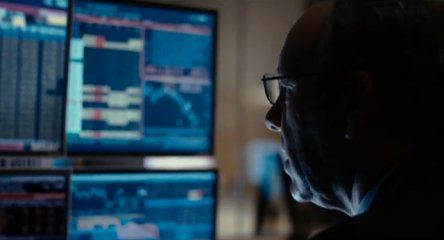This is what the beginning of a fire sale looks like.

Anyone who wants to understand how the 2008 financial crisis came about, but doesn't want to spend hours upon hours reading up on the subject, would do well to check out J.C. Chandor's 2011 film Margin Call, which is set at a fictional investment bank on the eve of the meltdown. An Academy Award nominee for its intelligent screenplay and winner of the Robert Altman Award (for its superb acting ensemble) and Best First Feature at the Independent Spirit Awards, Margin Call announced the arrival of a significant new voice, which will be put to the test when the virtually wordless Robert Redford one-hander All Is Lost comes out later this month. Until then, I'll continue to marvel at Chandor's way with words.
He also has a keen sense for how to cast actors capable of making a meal of the banquet that he sets out for them (with one glaring exception). It all starts on a rather black Thursday that finds Stanley Tucci, the head of risk management with 19 years at the company, getting the boot along with four-fifths of his charges. It's part of a massive shakeup that's made even more so when he passes something he's been working on to risk analyst Zachary Quinto (who dodged the layoffs), who stays after hours crunching the numbers and figures out why they don't add up. Thus begins a long, sleepless night for Quinto and his co-worker (Penn Badgley) and their boss (Paul Bettany) and their boss's boss (Kevin Spacey) and their boss's boss's boss (Simon Baker) and their boss's boss's boss's boss (Jeremy Irons). The very fact that Irons helicopters in is indication enough of how serious the situation is, especially after senior analysts Demi Moore (the only real weak link in the cast) and Aasif Mandvi have checked Quinto's math.
With all these characters in play, it's only natural that some are going to be underdeveloped. (Fresh-faced Badgley mostly seems to stick around so Chandor can show how such an upheaval affects those at the start of what they believe is going to be a long and lucrative career.) The ones that fare best are Spacey's beleaguered middle manager, who's already an emotional wreck over his dying dog, the ousted Tucci, who is insanely good with numbers, and top man Irons, who thinks so long-range he's able to rattle off the dates of financial calamities going back centuries. The fact that we are still living with the consequences of the actions of his real-life counterparts five years later says a lot about how relevant this film continues to be.